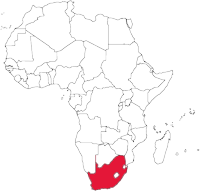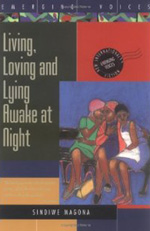
 Living, Loving and Lying Awake at Night, by South African author Sindiwe Magona, was recognized as one of "Africa's
100 Best Books of the 20th Century." In "Part One: Women at work," Magona tells the story of Atini, who is forced by dire poverty
to leave her children behind in her village and go off to work as a domestic servant for a medem, as the white housewives are
called. Still in her twenties, Atini has five surviving children and herself to provide for while her husband is away working
in the mines. He returns once a year to get her pregnant, and then forgets about his family for the next eleven months. After
much soul searching, she decides that "the only way she could be a mother to her children … would be to leave them."
Forced by circumstances into a new life, she not only has to learn how to be a maid, but also how to navigate the gossipy
social community of the domestic workers. The section is bookended by two opening pieces and a concluding story that show Atini's
version of this experience. In between are six interlocking stories told by the other domestic workers she encounters. These
sketches illustrate the various ways they face discrimination.
Living, Loving and Lying Awake at Night, by South African author Sindiwe Magona, was recognized as one of "Africa's
100 Best Books of the 20th Century." In "Part One: Women at work," Magona tells the story of Atini, who is forced by dire poverty
to leave her children behind in her village and go off to work as a domestic servant for a medem, as the white housewives are
called. Still in her twenties, Atini has five surviving children and herself to provide for while her husband is away working
in the mines. He returns once a year to get her pregnant, and then forgets about his family for the next eleven months. After
much soul searching, she decides that "the only way she could be a mother to her children … would be to leave them."
Forced by circumstances into a new life, she not only has to learn how to be a maid, but also how to navigate the gossipy
social community of the domestic workers. The section is bookended by two opening pieces and a concluding story that show Atini's
version of this experience. In between are six interlocking stories told by the other domestic workers she encounters. These
sketches illustrate the various ways they face discrimination.
No matter what sort of medem each woman works for, they all share in the frustrations of their situation. Whether their employer is good or bad, overall, they are condescended to and treated paternalistically, humiliated, and to add insult to injury, are automatically assumed to be thieves. One woman, Sheila, objects that she spends the whole day cleaning for the white family but is regarded as dirty. Virginia says her medem always “traced all bad smells in her house to my body,” despite all her cleaning. Many of the employers salve their consciences by giving the women their old clothing, or used toys and children's books. But one of the young maids, Joyce, protests that despite gainful employment, the maids are stuck in poverty because they are paid the equivalent of pocket money for a twelve-year old white child. The women want to provide for their families and not be dependent on white people's charity. As she aptly puts it: "nothing can make up for underpaying one's employee. Nothing, except increasing her wages."
Dire inequities in South African society have given these women no options but to work under appalling conditions. In the voice of a less-skilled storyteller, "Women at work" could have come off as preachy; instead, it is both engrossing and thought-provoking. Magona's use of multiple viewpoints is highly effective in telling the story of one woman to represent the stories of countless African women living in South Africa. This story has much broader implications, however, and its message is applicable to the plight of domestic workers worldwide. I suggest this book as a must-read for anyone who is even considering hiring household help.
Part two, "…And other stories," is made up of eight short pieces that share a common thread of girls and women struggling to retain their dignity and humanity in a poverty-stricken world. Although this may sound like a depressing collection, Magona's sensitive approach made me thoughtful and reflective. I found "Flight," "It was Easter Sunday the day I went to Netreg," and "Two little girls and a city" to be particularly moving.
Sindiwe Magona is a fascinating and inspiring person who could easily be the protagonist in one of her own stories. Like many of her characters, she grew up impoverished in a South African village. Through diligent attention to her education, she eventually climbed her way out of destitution and was awarded a scholarship to study at Columbia University, where she eventually earned her Masters in Social Work. This led to various positions at the United Nations where she used her skills and intelligence in the anti-apartheid movement. Over the last 35 years, Magona has earned multiple awards for her writing and civil rights efforts. She has now retired to Cape Town, where she continues to fight for the rights of South African women and children.


Interlink, paperback, 9781566561419
David Phillip, Publishers; paperback, 9780864866462